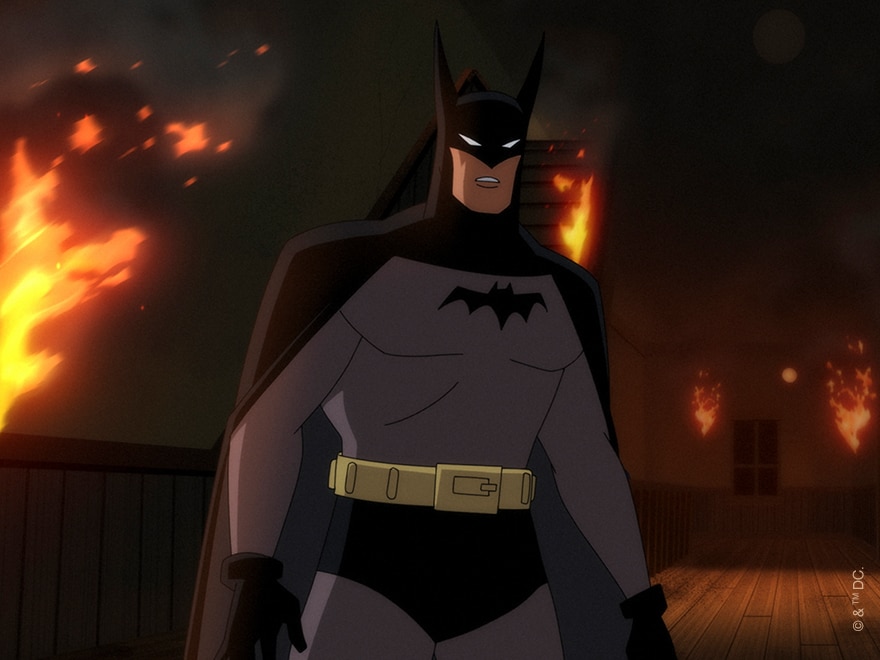Nostalgia is a word that gets thrown around a lot these days. We are in an era of pop culture rife with reboots, remakes and period pieces set in the late 20th century. As it turns out, “nostalgia” comes from the Greek word “nostos,” which means something along the lines of “returning home.” For so many of us, we don’t have to look far in today’s media landscape to find the latest iteration of something we loved as children.
I don’t harbor any disdain for nostalgia inherently. I’ve been told that I have a massive grin on my face while rewatching episodes of Batman Beyond. I just approach the nostalgic with a critical eye. Why are we feeling this way? What compels us to seek out the nostalgic?
This brings me to Batman: Caped Crusader. Executive produced by heavyweights such as Bruce Timm, J.J. Abrams and Matt Reeves, the new Prime Video series harkens back to 1992’s excellent Batman: The Animated Series. Thanks to Bruce Timm’s instantly recognizable creative fingerprint—noir-inspired artwork and plots rendered in 2D animation—Batman: The Animated Series shaped an entire generation’s view of the Dark Knight.
I should certainly know. I was one of those kids who sat cross-legged on the floor of my family’s living room every Saturday morning to hear the late, great Kevin Conroy voice the man I wanted to be when I grew up. Timm’s work on Batman: The Animated Series and the film, Batman: Mask of the Phantasm(which he co-directed), were among the first things that crafted me into a DC fan. In Timm’s vision of Batman, I found comfort and community. I wouldn’t be here writing this without Batman: The Animated Series getting me hooked on the wonderfully goth world of the Dark Knight.
I’m now greying (slightly!) and at an age that my younger self would probably consider “old,” but once again, Bruce Timm has brought us another Batman animated series. As I watched Caped Crusader for the first time, I was struck by a sense of how natural it all felt. Batman: Caped Crusader plays like a fitting extension of Batman: The Animated Series. True, the digital animation doesn’t have the same charming texture as the original cel animation from Batman: The Animated Series (after all, times change), but Caped Crusader’s writing is every bit as sharp as the earlier series.
There’s also the look of the characters, which boast Timm’s signature art style while managing to feel fresh and distinct from his earlier designs on Batman: The Animated Series. Those designs were beautiful in their simplicity, while the character designs of Caped Crusader are notably more detailed. The eyes of Caped Crusader’s characters are more expressive, and Bruce Wayne’s thick eyebrows are a perfect fit for Hamish Linklater’s brooding performance.
In watching Batman: Caped Crusader, I wondered about nostalgia, and its root, “nostos.” As I was swept up in the drama of the new series, just as I was when I was sitting on the floor watching Batman: The Animated Series more than twenty years ago, was I returning home, or going someplace new?
The longer I thought about it, the more I realized I wasn’t actually experiencing nostalgia. Rather, I was satisfying a hunger to see more Batman stories produced by Bruce Timm. As such, Caped Crusader shouldn’t be seen as nostalgia fuel, but rather evidence of an artist’s growth over the course of three decades. I have no idea if Bruce Timm sees the character and world of Batman as a “home,” but if he does, it’s clear that he isn’t afraid to redecorate.
Batman: Caped Crusader is now streaming on Prime Video.
Jules Chin Greene writes about comics, TV, games and film for DC.com, and his work can also be found at Nerdist, Popverse and Multiverse of Color. You can follow him on Twitter and Bluesky at @JulesChinGreene.
NOTE: The views and opinions expressed in this feature are solely those of Jules Chin Greene and do not necessarily reflect those of DC or Warner Bros. Discovery, nor should they be read as confirmation or denial of future DC plans.

